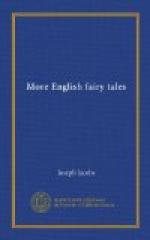There still remains the curious parallel from Belfast to which Mrs. Gutch has drawn attention. Magic pipers are not unknown to English folk-lore, as in the Percy ballad of The Frere and the Boy, or in the nursery rhyme of Tom the Piper’s son in its more extended form. But beguiling into a mountain is not known elsewhere except at Hameln, which was made widely known in England by Verstegan’s and Howell’s accounts, so that the Belfast variant is also probably to be traced to the Rattenfaenger. Here again, as in the case of Beddgellert (Celtic Fairy Tales, No. xxi.), the Blinded Giant and the Pedlar of Swaffham (infra, Nos. lxi., lxiii.), we have an imported legend adapted to local conditions.
XLV. HEREAFTERTHIS
Source.—Sent me anonymously soon after the appearance of English Fairy Tales. From a gloss in the MS. “vitty” = Devonian for “decent,” I conclude the tale is current in Devon. I should be obliged if the sender would communicate with me.
Parallels.—The latter part has a certain similarity with “Jack Hannaford” (No. viii.). Halliwell’s story of the miser who kept his money “for luck” (p. 153) is of the same type. Halliwell remarks that the tale throws light on a passage in Ben Jonson:
Say we are robbed,
If any come to borrow
a spoon or so
I will not have Good
Fortune or God’s Blessing
Let in, while I am busy.
The earlier part of the tale has resemblance with “Lazy Jack” (No. xxvii), the European variants of which are given by M. Cosquin, Contes de Lorraine, i., 241. Jan’s satisfaction with his wife’s blunders is also European (Cosquin, l.c., i., 157). On minding the door and dispersing robbers by its aid see “Mr. Vinegar” (No. vi.).
Remarks.—“Hereafterthis” is thus a melange of droll incidents, yet has characteristic folkish touches ("can you milk-y, bake-y,” “when I lived home”) which give it much vivacity.




